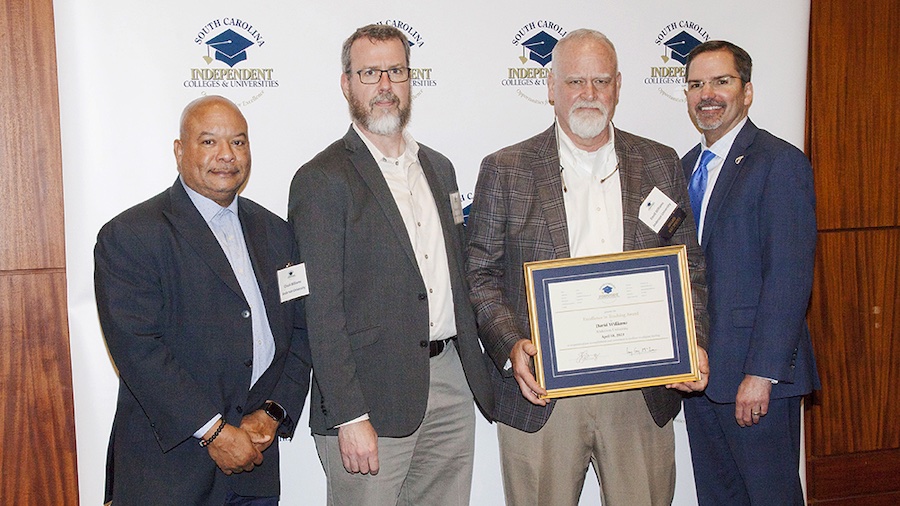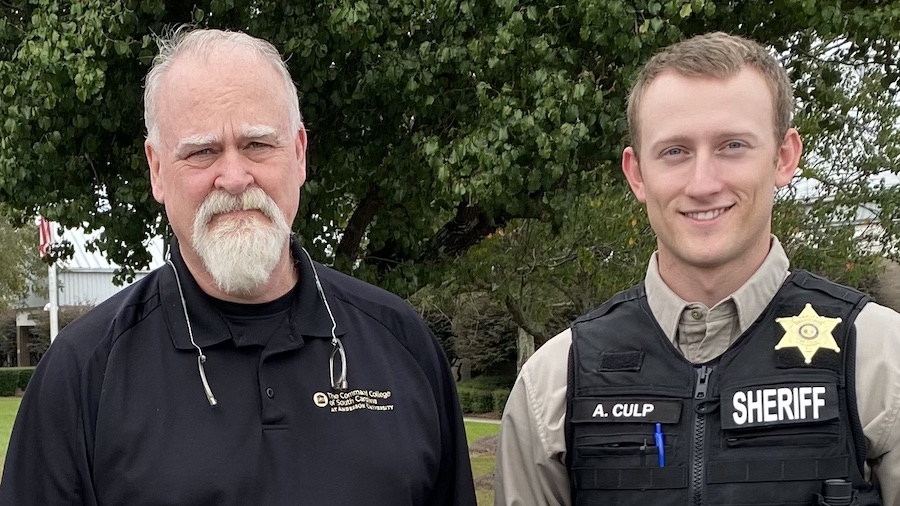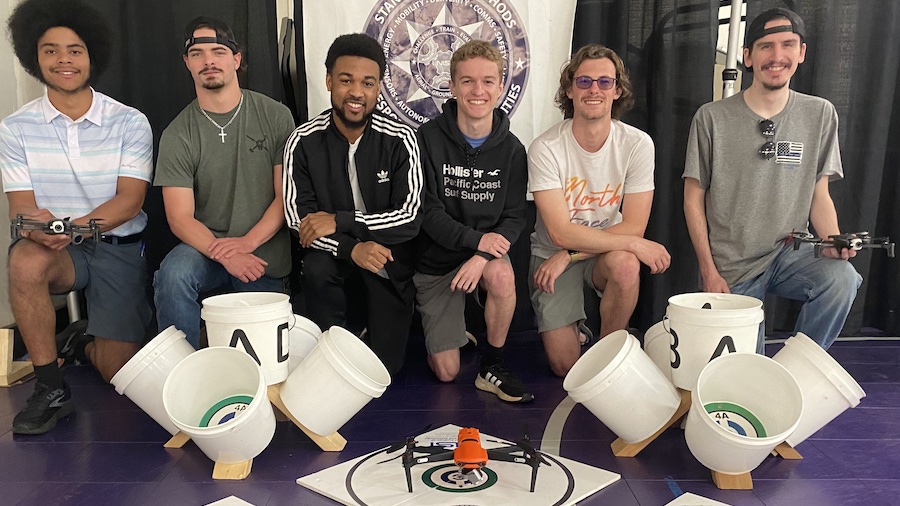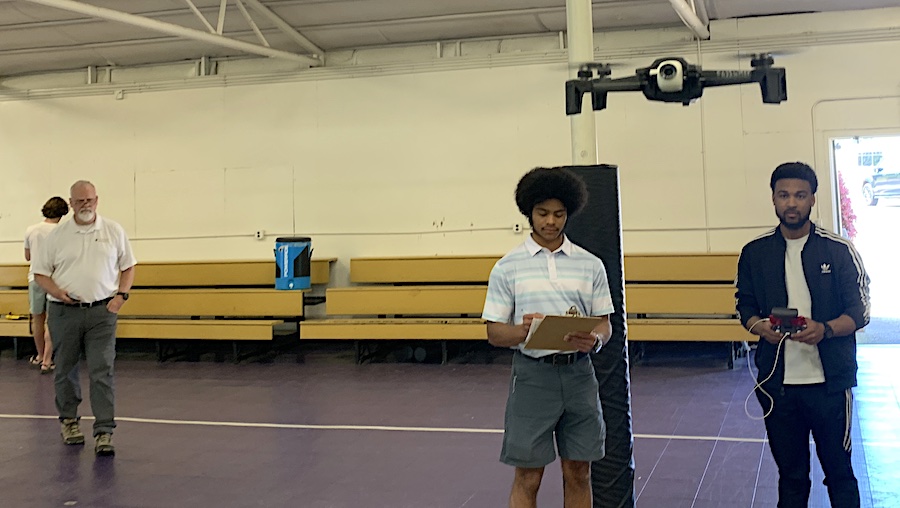Funding from South Carolina Independent Colleges and Universities (SCICU) will help Anderson University’s South Carolina School of Public Service and Administration better train students to operate drones in public safety applications.

Professor David Williams (second from right) received the 2023 SCICU Excellence in Teaching Award, which includes a $3,000 grant award for his project, “Drones and Remote Piloting for Criminal Justice Education and Research.” (Williams is pictured above with Dr. Chuck Williamson, dean of the Anderson University School of Public Service and Administration; Dr. Nathan Cox, assistant provost and Dr. Ryan Neal, provost.)
Drone technology is increasingly being used in public safety organizations. Even smaller agencies, who would have never been able to afford a helicopter, are able to purchase and use multiple drones.
“Years ago, to purchase a professional drone suitable for search and rescue was upwards of $80,000; however, drone technology is so advanced and affordable now, you can get a professional drone with FLIR (Forward Looking Infrared) for about $8,000,” Williams said. “What’s needed are more public safety personnel trained in the use of drones for search and rescue, crime scene investigation and in other areas of public safety. The number of uses is still being developed. It’s only limited to our imagination how we might use this developing technology. One of the things I’ve always tried to do is blend academic theory with real-world practical application and to put our students on the cutting edge of technology. However, in the case of drones, it is also to equip our students with knowledge that ensures they comply within the legal framework of state and federal law, and the privacy concerns of the communities they will be sworn to protect. Since drone technology is advancing faster than the law, this work continues to be challenging for criminal justice educators.”
While there are drone programs offered at colleges and universities, according to Williams, few can be found within a criminal justice program.

Andrew Culp (pictured at right with Williams), a deputy sheriff with the York County Sheriff’s Office and a specialized team member in their drone unit, was the first in Anderson University’s program to become a certified drone pilot in 2020. Culp feels that Williams and the School of Public Service and Administration opened professional doors for him that would have not been possible otherwise. He noted that his class instruction went beyond just the mechanics of flying a drone and offered him an in-depth exposure to constitutional law and other regulations affecting the use of drones in law enforcement work. Culp used this knowledge for his internship with the Chester County Sheriff’s office to write their first drone policy prior to his graduation from Anderson University.
“That class, along with getting certified through (Williams’) program was a big reason I was able to get into York County’s drone program so quickly. Usually there’s a wait period of 18 months prior to being able to put on a specialized team, but seeing as how I had as much experience as I had, they were able and willing to waive that for me so I could then just go ahead and jump right in and start flying,” Culp said.
Gabriel Lindner, a homeland security major, was the first in his class this year to achieve his Federal Aviation Administration (FAA) Part 107 commercial drone pilots license.
“My family has a history in aerospace. Dad’s an educator and a former pilot, so that’s what sparked my interest, and then knowing that it would be handy for the future,” Lindner said. “I’m not sure exactly what I’m going to be doing yet, but certification is always good to have.”

“Our team at the School of Public Service and Administration is trying to provide undergraduate students with actual real-world licenses, certifications—anything that’s in their career field. For instance, Dr. Howard Murphy, who teaches Homeland Security and Emergency Preparedness, provides instruction for certifications in CERT classes, Basic First Aid, CPR, AED, Stop the Bleed (combat medical care for active shooter situations), intermediate and advanced incident command systems—all kinds of things,” Williams said. (Above: pictured from left are Gabriel Lindner, Shane Harris, Markel Samuel, Matthew Saul, Zachery Seiter and William Becknell.)
Markel Samuel, a cybersecurity major, also taking the course this semester said, “As the world continues to evolve as far as security measures and other forms of technology, drones are at the forefront of that; so as we continue to utilize drone technology more and more for security purposes, for safety purposes, things of that nature, I think it’s very beneficial to learn this kind of stuff. In cybersecurity, one of the big things we are studying is using different technologies to either promote awareness or to strengthen security within organizations, and drones are a huge part of that, whether that be for surveillance purposes or just securing drone technologies in general.”
Williams, who came to Anderson University after retiring from the Greenville County Sheriff’s Office as their Administrative Commander, was honored at an awards banquet at the Columbia Metropolitan Convention Center April 18. Professors from 21 SCICU member institutions were honored with awards.

